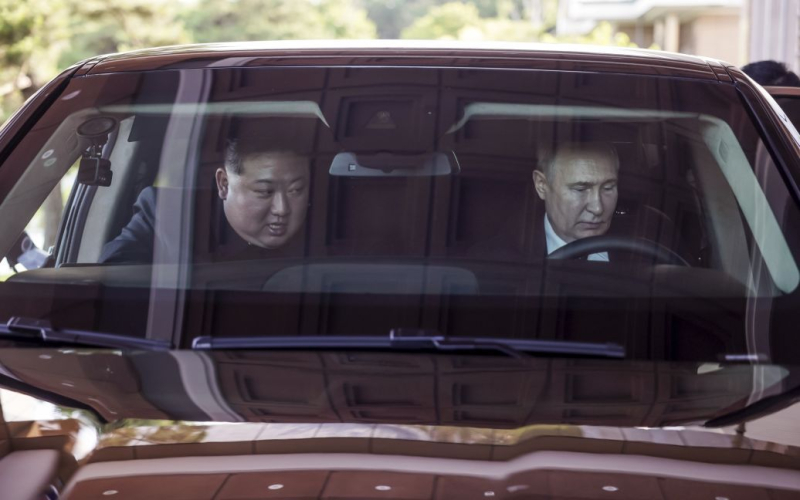
~6 0~p>At the heart of the agreement is a mutual defense obligation, which requires both countries to come to each other's aid if attacked.
There is nothing “peaceful” about the defense pact that Kremlin dictator Vladimir Putin signed yesterday, June 19, with his North Korean counterpart Kim Jong-un. In contrast, the comprehensive strategic partnership agreed upon between the two leaders during Putin's visit to Pyongyang demonstrates the deepening of ties between the two exiled states.
As stated in The Telegraph, Putin explained that the conclusion of a pact between Moscow and Pyongyang is key to countering the efforts of the United States and its allies to impose a “neo-colonialist dictatorship” around the world.
At the heart of the agreement is a mutual defense obligation, which requires both countries to come to each other's aid if attacked. After Kim Jong Un welcomed the signing of the “peace and defense” pact, Putin made it clear that it provided for “mutual assistance in the event of aggression against one of the parties.”
This alliance can be called “NATO for the poor.” The fact that both regimes found it necessary to rally in each other’s defense demonstrates their fundamental weakness,” food publication.
Alliance with the “mediocre dictator”
The signing ceremony itself had overtones of the Soviet era, when Moscow helped install the Kim dynasty in power at the end of World War II. The North Koreans have gone to great lengths to demonstrate the importance of their anti-Western agreement. The carefully planned meeting between the two leaders took place in front of a large banner that proclaimed that “North Korean-Russian friendship will last forever.”
For his part, Putin tried to impress Kim by giving him an Aurus limousine worth more than 300 thousand dollars, known as the “Russian Rolls-Royce”.
But these obvious manifestations of dictatorial consumption cannot hide the fact that the growing military cooperation between Moscow and Pyongyang was established out of desperation, the publication writes.
For all of Putin's bravado about the progress he says his troops are making in Ukraine, the hard truth is that the Russians have suffered catastrophic losses. According to Western intelligence estimates, the death toll in Russian wars has exceeded 350,000.
If Russia really became a military superpower to compete with the Western Alliance, then Moscow would not agree to an agreement with the “incompetent dictator” Kim.
Kim needs technology
The North Koreans are in an even worse situation. Pyongyang desperately needs food, fuel, money and high-quality weapons technology to help it survive economic sanctions imposed through its nuclear weapons program.
Despite this, the danger to international security posed by deepened cooperation between the two nuclear dictatorships cannot be underestimated.
The military support provided by North Korea, along with China and Iran, has proven vital to bolstering Putin's military efforts at a time when the Russian military is short on weapons. Since Kim Jong Jong Un began communicating more closely with Putin, there has been a sharp increase in North Korean ammunition supplies.
U.S. officials say more than 10,000 shipping containers filled with artillery shells, missiles and other weapons have been shipped to Russia, with at least 10 North Korean-made missiles launched at Ukrainian targets since September.
Pyongyang's missile systems are based on Soviet-era designs like Iran's, meaning they can be easily adapted to Russian fire systems.
What Kim Than Jong Jong gets in exchange for Putin's military support is more opaque, although the North Koreans have made no secret of their desire to develop their space, missile and nuclear programs.
It is no coincidence that shortly after Kim returned from his meeting with Putin last year, the North Koreans finally succeeded in launching their first military reconnaissance satellite, Malligyong-1, after two previous failed attempts. Having access to such satellites improves North Korea's ability to more accurately target opposition forces with its missiles.
Pyongyang is also seeking access to Russian expertise in other areas, such as advanced weapons, nuclear enrichment and atomic propulsion for submarines.
It's debatable how much technological cooperation Putin is willing to forge with Pyongyang, especially if it risks alienating the Kremlin's other key ally, China.
“For Western leaders, there is one more point to consider: the new North Korea-Russia defense pact should not be viewed in isolation. Both countries are also closely aligned with Iran and China, two autocratic regimes similarly committed to undermining the Western alliance. And the closer they cooperate, the greater the risk they pose to our future security,” the publication concluded.
Recall, Russian President-dictator Vladimir Putin and North Korean leader Kim Jong-un signed an agreement on a “comprehensive strategic partnership” in Pyongyang. In particular, it is partially aimed at military-technical cooperation between Moscow and Pyongyang and is proof of a joint struggle against the West. This is according to a new report from the Institute for the Study of War (ISW).
Related topics:
More news

